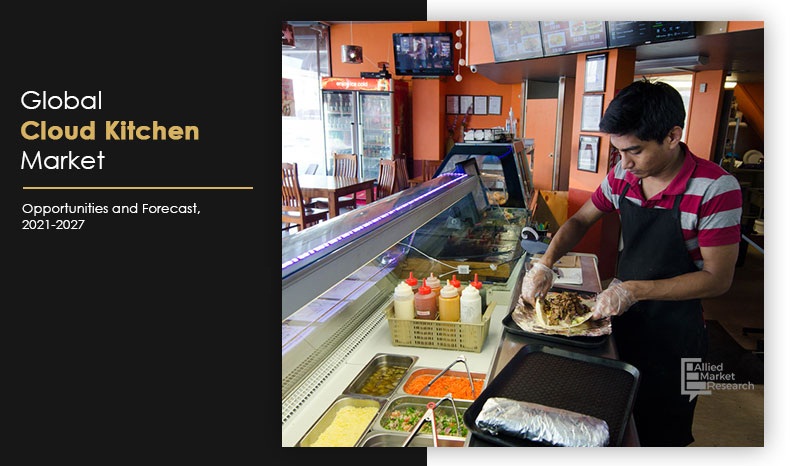According to a new report published by Allied Market Research, titled, “Cloud Kitchen Market by Type, Product Type and Nature: Global Opportunity Analysis and Industry Forecast, 2021–2027,” the global cloud kitchen market size was valued at $43.1 billion in 2019, and is estimated to reach $71.4 billion by 2027 with a CAGR of 12.0% from 2021 to 2027. Cloud kitchens are also known as dark or shared kitchens. Cloud kitchens are delivery-only kitchens which can be owned by a brand or third party working with various brands. Moreover, with an increasing number of youngsters population globally along with changing taste preference of the consumers has raised the demand for online food delivery. Hectic life schedule and rise in consumer disposable income are the major factors due to which trend of ordering food online has increased. Furthermore, increase in usage of smart phones, rise in literacy and easy access to the internet has made the work of ordering food easier. Now a days, food restaurant are tying up with online food service site such as FoodPanda for the delivery of food and also to increase their sales. Moreover, online food delivery services also provide lots of offers, which attracts the consumer and also helps in increasing consumer base. Hence, effective offers and good customer service boosts the growth of the cloud kitchen industry.
Moreover, technological advancements have helped in the development of the cloud kitchen market. The different methods of ordering food through telephone, online, and now by mobile apps have reduced the direct human interaction, which reduces the probability of human error and provides better customer service. In addition, the developments in database management systems have enabled the large market players to keep a better record of their consumers and to offer them lucrative offers frequently. The new advance technology such as autonomous vehicles, ground, and air can be used to deliver products as per the consumer choice. Moreover, the cloud kitchen manufacturers are creating apps and kiosks to capture data of the customers and restaurants to provide both a consistent and personalized experience to the customers. The use of new technological machine and robotics in the food industry also ensures quality and affordability. Hence, effective technology adopted by operators helps in driving the growth of market in terms of value sales. However, the increase in number of fine dining and quick service restaurants such as Subway, McDonald, Starbucks, KFC, Pizza Hut, Restaurant Brands International, and Dunkin Donut are one of the major factors that hampers the growth of the cloud kitchen market. In addition, these quick service restaurants have a global presence along with high amount of liquidity owing to which smaller cloud kitchens are unable to compete with these giants. Moreover, these giant quick service restaurants have large product offering, world class infrastructure along with best food delivery services, which attracts the consumer and hence, it affects the survival of cloud kitchen in the market.
Download Sample Report: https://www.alliedmarketresearch.com/request-sample/6773
There has been an increase in number of users on various social media sites with rise in internet penetration. Considering this, most of the key players in the cloud kitchen market strategize on promoting their products and services on these social media platforms. Social media marketing is one of the major strategies adopted by various companies and industries to promote their product offerings. Thus, rise in use of social media marketing is anticipated to provide lucrative cloud kitchen market opportunity for its growth and eventually increase its customers.
Key Findings Of The Study
By type, the independent cloud kitchen segment dominated the global market in 2019, and is expected to retain its dominance throughout the forecast period.
By product type, the burger/sandwich segment accounted for highest share in the cloud kitchen market growth in 2019, and is projected to grow at a CAGR of 10.0% from 2021 to 2027.
By nature, the franchised segment led the global cloud kitchen market demand in 2019, and is expected to retain its dominance throughout the forecast period.
By region, North America accounted for highest cloud kitchen market share in 2019, and is expected to grow at a CAGR of10.5%.
Get detailed COVID-19 impact analysis on the Cloud Kitchen Market: https://www.alliedmarketresearch.com/request-for-customization/6773?reqfor=covid
The key players operating in the cloud kitchen market analysis includes Kitchen United, Rebel Foods, DoorDash Kitchen, Zuul Kitchen, Keatz, Kitopi, Ghost Kitchen Orlando, Dahmakan, Starbucks (Star Kitchen) and Cloud Kitchen.
For Purchase Enquiry: https://www.alliedmarketresearch.com/purchase-enquiry/6773
Similar Reports:
Fast Casual Restaurant Market Expected to Reach $209.1 Billion by 2027
Bakery Processing Equipment Market Expected to Reach $18.7 Billion by 2026
About Allied Market Research:
Allied Market Research (AMR) is a full-service market research and business-consulting wing of Allied Analytics LLP based in Portland, Oregon. Allied Market Research provides global enterprises as well as medium and small businesses with unmatched quality of “Market Research Reports” and “Business Intelligence Solutions.” AMR has a targeted view to provide business insights and consulting to assist its clients to make strategic business decisions and achieve sustainable growth in their respective market domains. AMR offers its services across 11 industry verticals including Life Sciences, Consumer Goods, Materials & Chemicals, Construction & Manufacturing, Food & Beverages, Energy & Power, Semiconductor & Electronics, Automotive & Transportation, ICT & Media, Aerospace & Defense, and BFSI.
We are in professional corporate relations with various companies and this helps us in digging out market data that helps us generate accurate research data tables and confirms utmost accuracy in our market forecasting. Each and every data presented in the reports published by us is extracted through primary interviews with top officials from leading companies of domain concerned. Our secondary data procurement methodology includes deep online and offline research and discussion with knowledgeable professionals and analysts in the industry.
